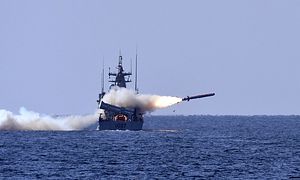Last week, the Pakistani Navy carried out the first-ever test launch of its Harbah anti-ship and land-attack cruise missile (LACM/ASCM). The test was carried out in the North Arabian Sea on January 3, according to a press release from Pakistan’s Inter-Services Public Relations (ISPR).
“The successful live weapon firing has once again demonstrated the credible fire power of Pakistan Navy and the impeccable level of indigenization in high tech weaponry achieved by Pakistan’s defence industry,” ISPR noted in a statement. “The missile accurately hit its target signifying the impressive capabilities of Harbah Naval Weapon System.”
The Harbah is thought to be derived from Pakistan’s Babur family of cruise missiles. Pakistan has tested multiple Babur variants, beginning with the ground-launched Babur-I to the submarine-launched Babur-III, which was first tested last January. Though ISPR made no comment on the missile’s payload capabilities, its origin in the Babur family would suggest that it could be converted for both conventional and nuclear payload delivery.
According to Pakistani media reports, Pakistan’s Ministry of Defense Production had planned to develop a missile system for the PNS Himmat by October 2018. According to the Ministry’s 2014-2015 yearbook, the Directorate General of Munitions Production (DGMP) had been tasked with “the indigenous (sic) developing of ship-borne system with Land Attack Missile [LACM] and Anti ship Missile” by that date.
The missile was launched from an Azmat-class fast attack craft, PNS Himmat. PNS Himmat was commissioned into the Pakistan Navy last summer after extensive sea trials. Along with PNS Himmat, PNS Azmat and PNS Deshat are likely to also operate the Harbah ASCM once the system is declared operational.
Pakistan’s test-firing of the Harbah came shortly after U.S. President Donald Trump threatened to end U.S. military aid to the country in a tweet. While U.S. aid does not go toward Pakistan’s indigenous strategic weapons research and development, the ISPR statement noted that Pakistan’s chief of naval staff, Admiral Zafar Mahmood Abbasi, said that Pakistan needed to “reduce reliance on foreign countries” and “emphasized the need to capitalize on indigenous defense capabilities.”

































